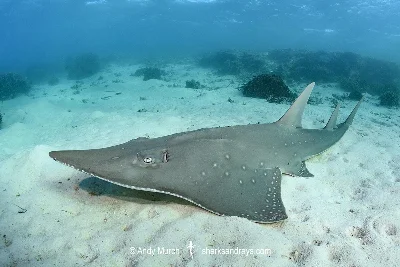Bottlenose Wedgefish
Rhynchobatus australiae
The Rhynchobatus undefinede, commonly referred to as the white-spotted guitarfish, white-spotted wedgefish, or bottlenose wedgefish, is a species within the Rhinidae family. Its habitat spans the Indo-Pacific region, from the East African coastline and the 🌊 Red Sea to 🇹🇼 Taiwan, the 🇵🇭 Philippines, and 🇦🇺 Australia, inhabiting depths up to at least 60 meters (200 feet). This species is part of a complex that also includes the giant guitarfish, broadnose wedgefish, and potentially the smoothnose wedgefish.
Reaching a length of approximately 3 meters (10 feet), Rhynchobatus undefinede exhibits distinctive morphological features at various life stages. At birth, individuals measure between 46-50 cm. Juveniles and young adults display a grayish or brownish dorsal surface, adorned with scattered white spots and a characteristic black spot above each pectoral fin, flanked by three white spots. In contrast, mature adults tend to assume a darker coloration, often appearing nearly black, with spots becoming less discernible.
The species is characterized by a tail fin with pronounced upper and lower lobes, distinguishing it from the fiddler and shovelnose rays, which possess a reduced lower lobe. The snout is sharply pointed and integrates seamlessly with the flat triangular pectoral fins, while the gills are located on the ventral surface of the head. The anterior dorsal fin aligns with the pelvic fins, and a series of thorns extends along the dorsal midline.
Reproductive adaptations of Rhynchobatus undefinede include aplacental lecithotrophic viviparity, with litter sizes ranging from 7 to 19 offspring. The species predominantly feeds on demersal fishes, crustaceans, and molluscs. Behavioral responses to divers typically involve moving away when approached closely.
Conservation Status: Critically Endangered
Despite its expansive range, the 🇦🇺 Australian wedgefish faces significant conservation challenges. It exhibits low reproductive productivity, with small litter sizes and a generation length of approximately 15 years. The fins of wedgefishes and giant guitarfishes are highly valued for shark fin soup, resulting in intense commercial demand and severe population declines across much of its range. Although some protection is afforded within 🇦🇺 Australian waters, these constitute only a minor portion of its habitat. Over the past 45 years, global catch data indicates an alarming reduction of more than 80% in wedgefish populations.
Comments
Please, sign in to leave comment
No Comments yet
Last Update: May 28, 2025

